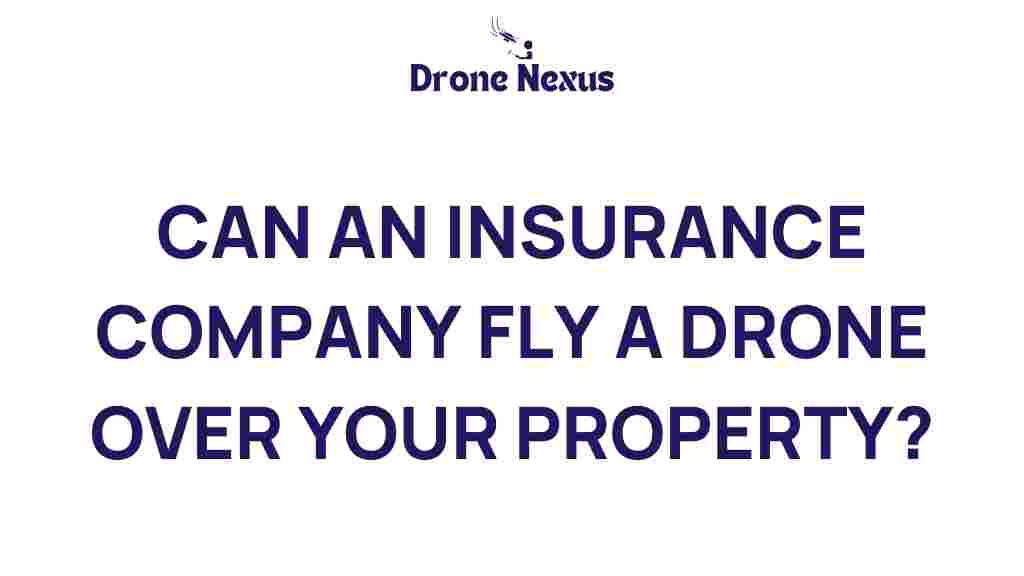Can an Insurance Company Legally Fly a Drone Over Your Property?
As technology advances, drones are becoming increasingly common in various industries, including insurance. The question arises: can an insurance company legally fly a drone over your property? This article aims to provide a comprehensive understanding of this issue while examining the legalities, potential benefits, and concerns associated with drone usage in the insurance sector.
Understanding the Role of Drones in Insurance
In recent years, drones have gained traction in the insurance industry for their ability to perform aerial surveys, assess damage, and streamline the claims process. Insurance companies utilize drones for several purposes, including:
- Property Assessments: Drones can access hard-to-reach areas, providing a thorough overview of properties.
- Damage Evaluation: After incidents like storms or fires, drones can quickly assess damage, allowing for faster claims processing.
- Fraud Detection: Aerial imagery can help insurers identify potential fraudulent claims.
Legal Framework Surrounding Drone Usage
Before diving into whether insurance companies can fly drones over private property, it’s essential to understand the legal framework governing drone usage. The Federal Aviation Administration (FAA) regulates drone operations in the United States, ensuring safety and compliance with aviation laws.
The following are key regulations that govern drone usage:
- FAA Regulations: Drones must be operated within visual line-of-sight, and commercial drone pilots must hold a Remote Pilot Certificate issued by the FAA.
- State Laws: Various states have enacted laws that specifically address drone usage, including privacy concerns and property rights.
Property Rights and Privacy Concerns
The question of whether an insurance company can legally fly a drone over your property often hinges on property rights and privacy concerns. Generally, property owners have rights to the airspace above their land; however, these rights can vary by state.
- Airspace Rights: Most property owners own the airspace up to a reasonable height. Drones flying at low altitudes may infringe on these rights.
- Expectation of Privacy: Homeowners have a reasonable expectation of privacy in their backyards and other secluded areas.
Insurance companies must navigate these legal nuances to avoid infringing on property rights and privacy laws.
Can an Insurance Company Legally Fly a Drone Over Your Property?
The short answer is: it depends. Here are some factors that influence the legality of an insurance company flying a drone over your property:
1. Purpose of the Flight
If the drone is used for legitimate purposes, such as assessing damage or evaluating a claim, the legality is typically more favorable. However, if the intent is deemed intrusive or illegal, it could lead to legal ramifications for the insurance company.
2. Compliance with Regulations
Insurance companies must adhere to FAA regulations and state laws regarding drone usage. Failure to comply can result in fines and legal consequences.
3. Obtaining Permission
While insurance companies may not always need explicit permission, obtaining consent from property owners can help mitigate legal risks. This is especially true if the drone will be flying at low altitudes or capturing images of private areas.
4. Notification Requirements
In some states, insurance companies may be legally required to notify property owners before flying a drone over their property. This requirement can vary, so it’s essential to understand local laws.
Step-by-Step Process: What to Do If You Encounter a Drone
If you discover an insurance company’s drone operating over your property, follow these steps:
Step 1: Observe the Drone
Take note of the drone’s behavior. Is it hovering over your property for an extended period? Is it capturing images or videos? Documenting this information can be helpful.
Step 2: Check for Notification
Look for any notification or documentation from the insurance company regarding the drone operation. If you haven’t received any communication, it may warrant further inquiry.
Step 3: Contact the Insurance Company
If you have concerns, reach out to the insurance company directly. They may be able to provide clarity regarding the drone’s purpose and legality.
Step 4: Reach Out to Local Authorities
If you believe the drone operation is illegal or invasive, contact local authorities or law enforcement. They can assist in determining the drone’s legality and addressing any violations.
Step 5: Review State Laws
Familiarize yourself with local drone laws and regulations. This information can empower you to take further action if necessary.
Troubleshooting Tips for Property Owners
If you’re concerned about drones flying over your property, consider these troubleshooting tips:
- Install Privacy Screens: If privacy is a concern, consider installing privacy screens or tall fences in your yard.
- Document Incidents: Keep a record of any drone sightings, including timestamps and descriptions of the drone.
- Educate Yourself: Understanding local and state laws regarding drone usage can better equip you to handle any issues.
- Engage with the Community: Consider discussing drone concerns with neighbors. A collective voice can have more impact.
Conclusion
The legality of an insurance company flying a drone over your property is a nuanced issue that depends on various factors, including purpose, compliance with regulations, and property rights. While drones offer considerable benefits to the insurance industry, the potential for privacy violations and legal disputes cannot be overlooked.
As a property owner, it’s essential to stay informed about your rights and local laws regarding drone usage. Engaging in open communication with insurance companies and understanding the legal landscape can help mitigate concerns. For more information on insurance-related topics, you can visit this link.
Stay vigilant and informed, and you can navigate the complexities of drone usage and insurance with confidence.
This article is in the category Safety and created by DroneNexus Team
